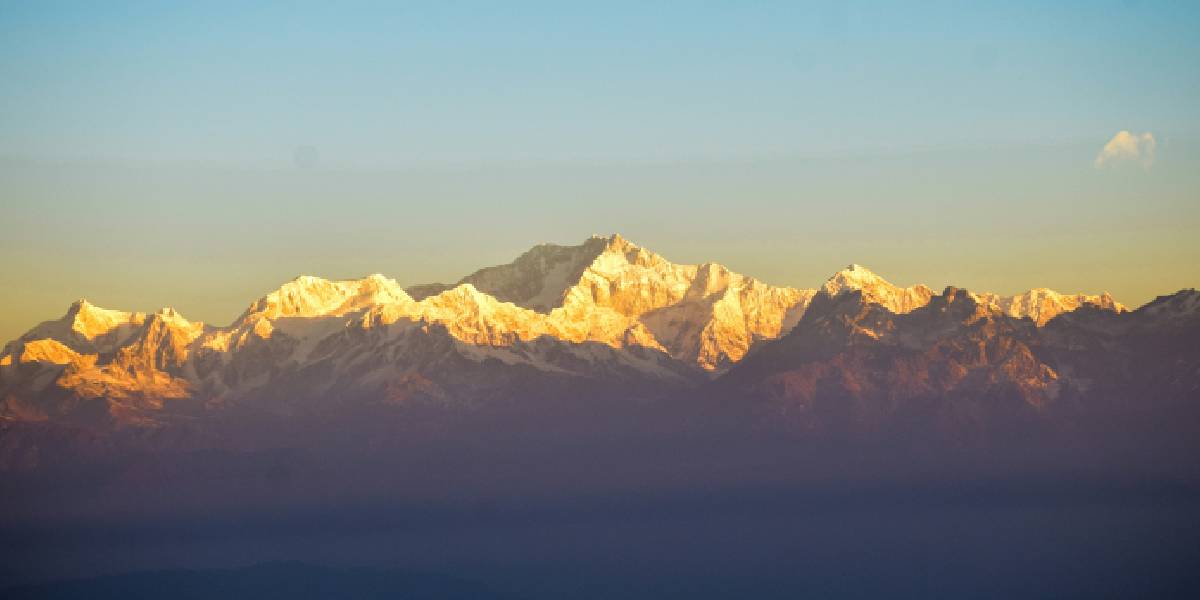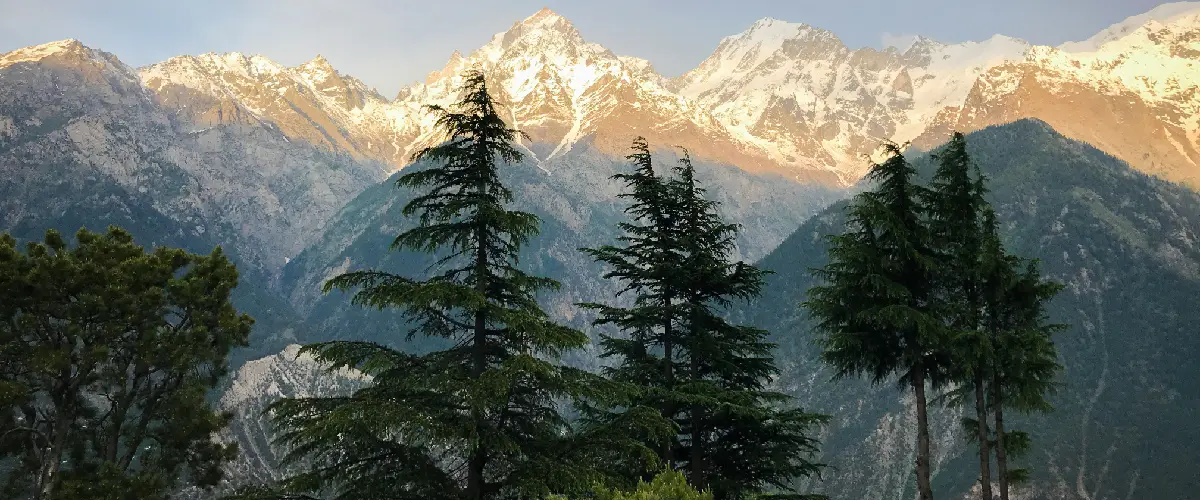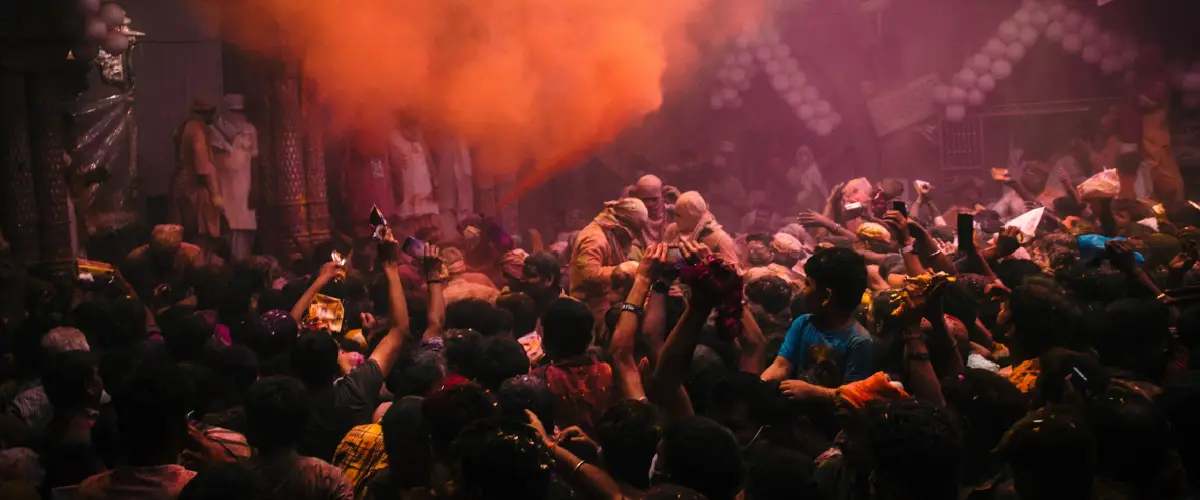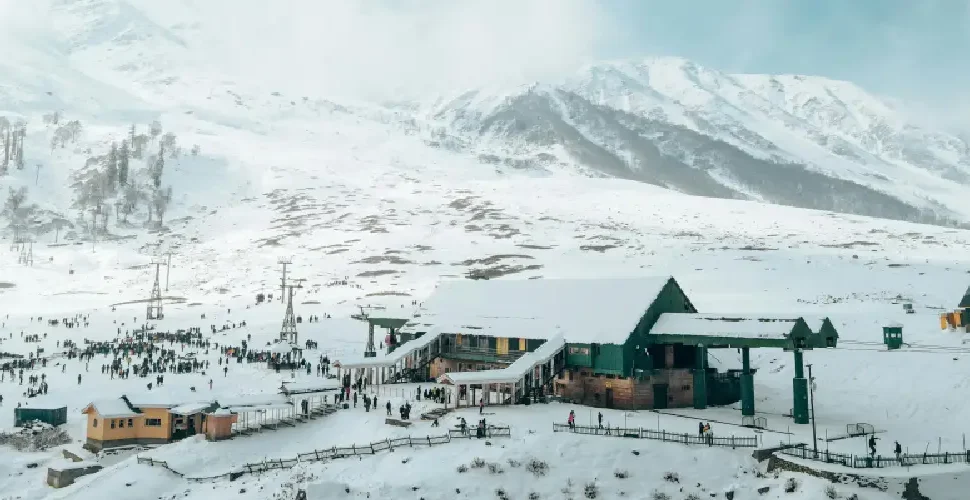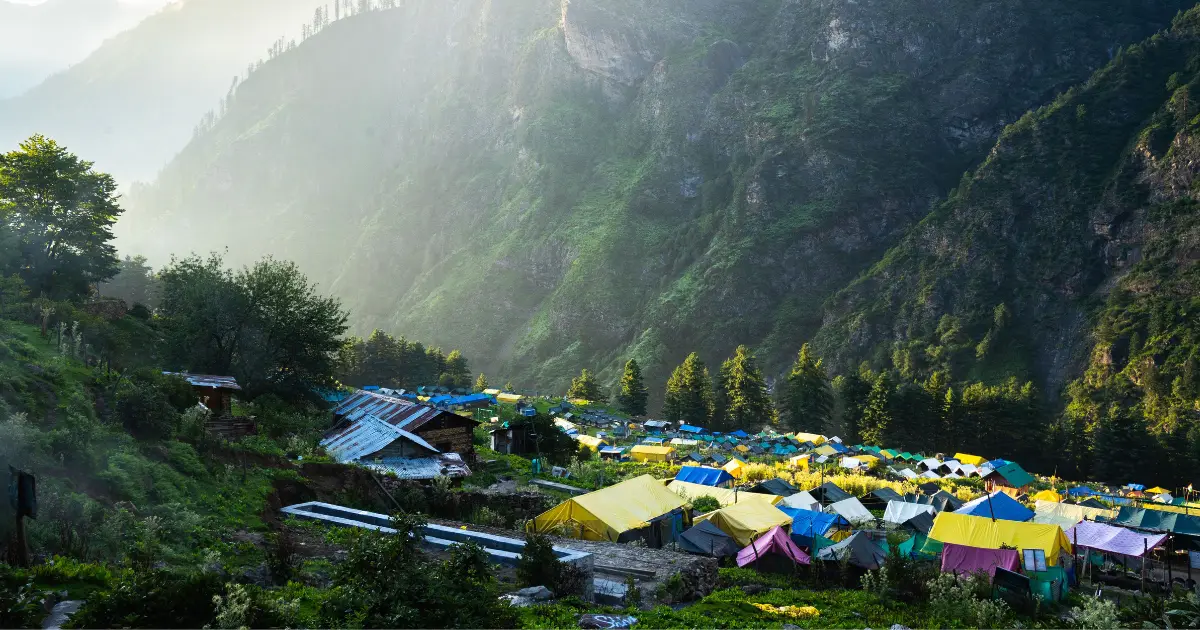Craving a vacation that explodes your senses with vibrant cultures, breathtaking landscapes, and soul-stirring experiences? Look no further than the North East, India’s hidden gem!
This is just a taste of the magic that awaits in the North East. Contact Us, to Book Your North east Dream Vacation. So, pack your bags, unleash your wanderlust, and get ready to embark on an unforgettable journey through these 20 must-visit destinations.
1. Majestic Kaziranga National Park
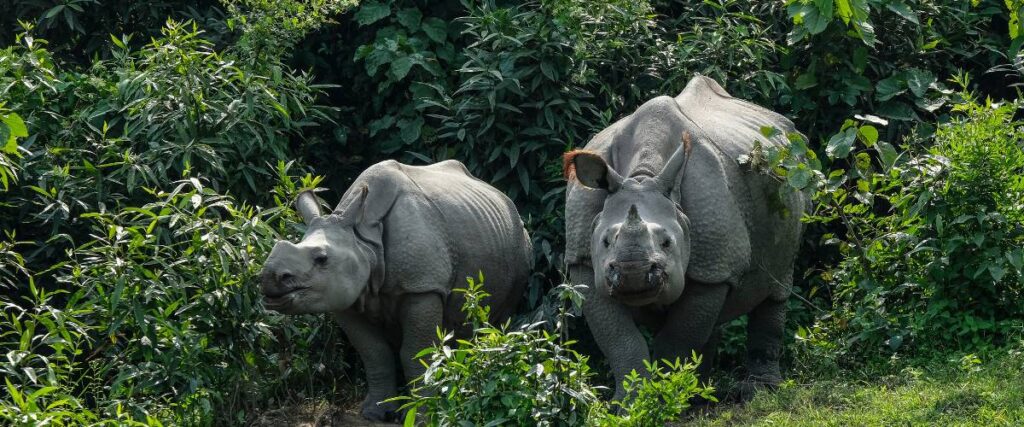
Best Time to Visit: November to April
Key Attractions: One-horned rhinoceros, Bengal tigers, diverse flora and fauna
Distance: Approximately 220 kilometers from Guwahati
Kaziranga National Park, a UNESCO World Heritage Site, is a haven for wildlife enthusiasts. The best time to visit is from November to April when the weather is pleasant. Witness the majestic one-horned rhinoceros, Bengal tigers, and a variety of bird species in their natural habitat.
Contact us to Book your North East Tour Package Now! Call at +91 98749 81274 or +91 98741 26283 or you can email us at connect.ttk@gmail.com
2. Mesmerizing Tawang Monastery
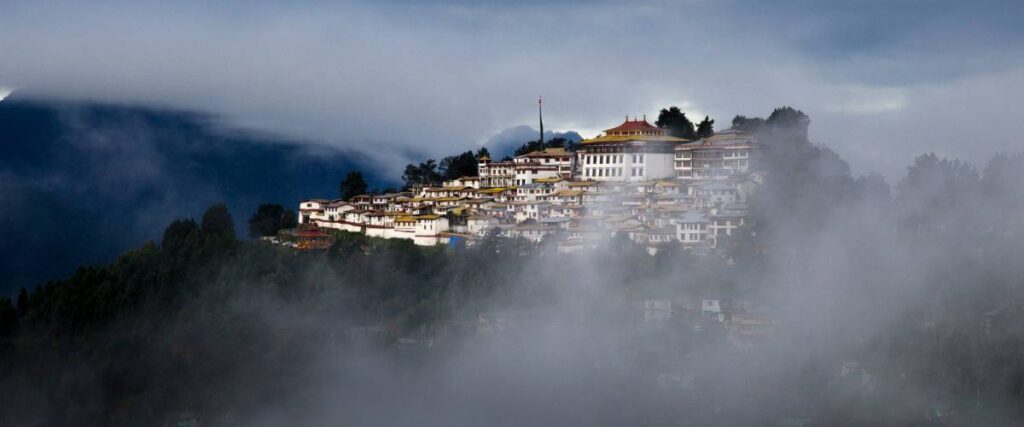
Best Time to Visit: March to October
Key Attractions: Tawang Monastery, Gorichen Peak, Tawang War Memorial
Distance: Approximately 555 kilometers from Guwahati
Perched at an altitude of 10,000 feet, Tawang Monastery is a spiritual gem. The best time to visit is from March to October when the weather is favorable. Explore the monastery, enjoy breathtaking views of Gorichen Peak, and pay homage at the Tawang War Memorial.
Contact us to Book your North East Tour Package Now! Call at +91 98749 81274 or +91 98741 26283 or you can email us at connect.ttk@gmail.com
3. Enchanting Nathula Pass
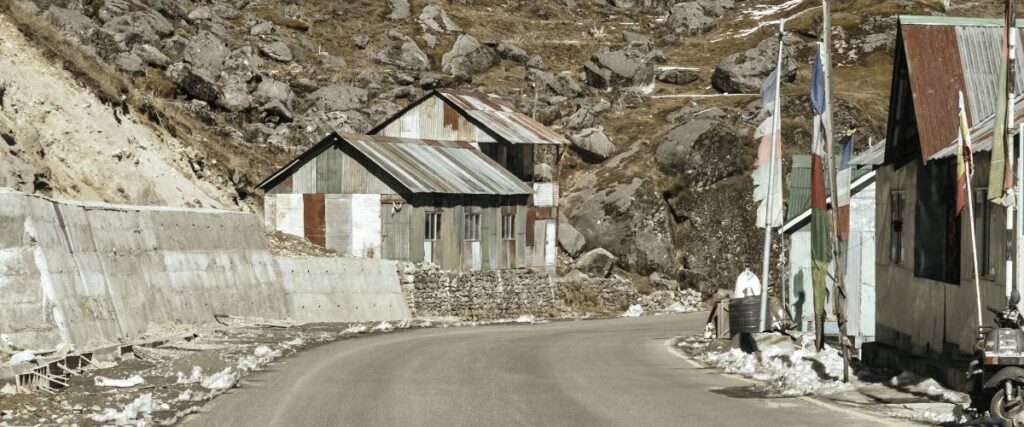
Best Time to Visit: May to October
Key Attractions: Indo-China border, Tsomgo Lake
Distance: Approximately 430 kilometers from Gangtok
Nathula Pass, connecting India and Tibet, offers panoramic views of the Eastern Himalayas. The best time to visit is from May to October when the pass is accessible. Explore the Indo-China border and witness the pristine beauty of Tsomgo Lake.
Suggested Read: Top 10 places to visit in Gangtok.
4. Picturesque Dawki River
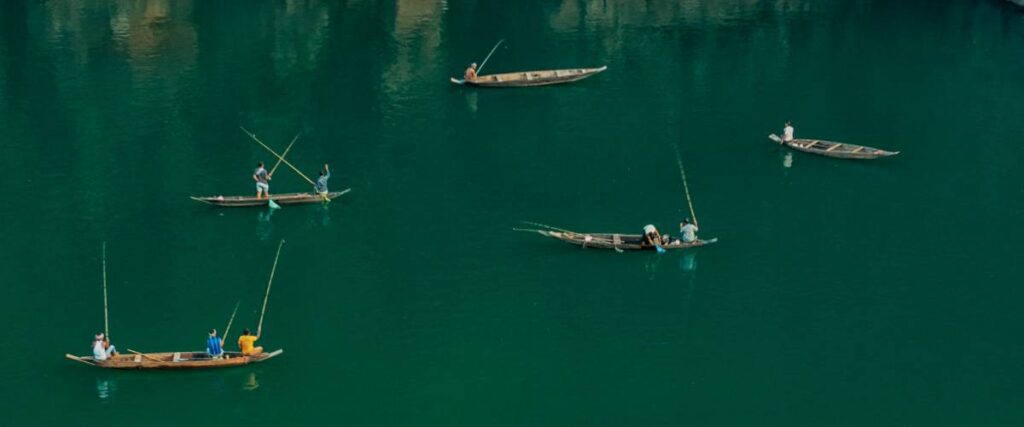
Best Time to Visit: October to March
Key Attractions: Umngot River, transparent waters
Distance: Approximately 82 kilometers from Shillong
Dawki River, with its crystal-clear waters, is a visual delight. The best time to visit is from October to March for pleasant weather. Experience the unique beauty of the Umngot River, known for its transparent waters.
Suggested Read: Best places to visit in Meghalaya.
5. Cultural Extravaganza in Shillong
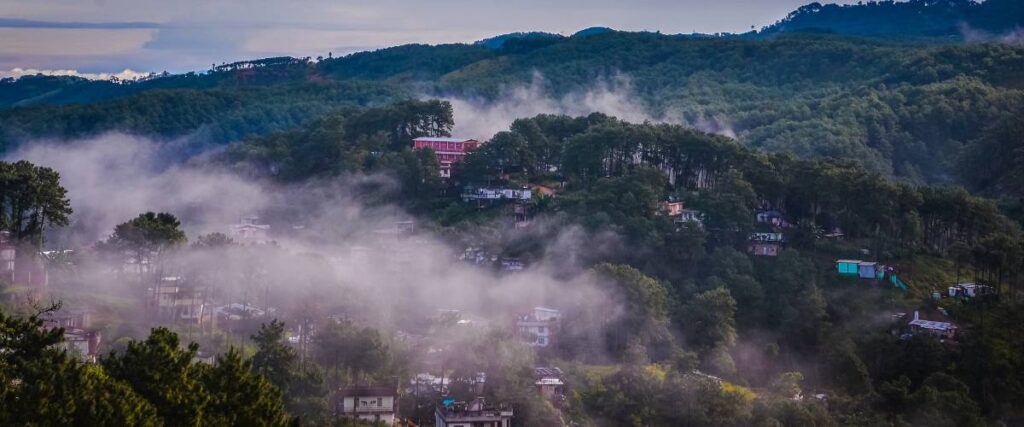
Best Time to Visit: September to May
Key Attractions: Ward’s Lake, Police Bazar, Elephant Falls
Distance: Approximately 100 kilometers from Guwahati
Known as the “Scotland of the East,” Shillong is a cultural hub. The best time to visit is from September to May. Explore Ward’s Lake, stroll through Police Bazar, and marvel at the beauty of Elephant Falls.
Suggested Read: Top 20 Hill Station in India.
6. Kamakhya Temple: A Spiritual Odyssey
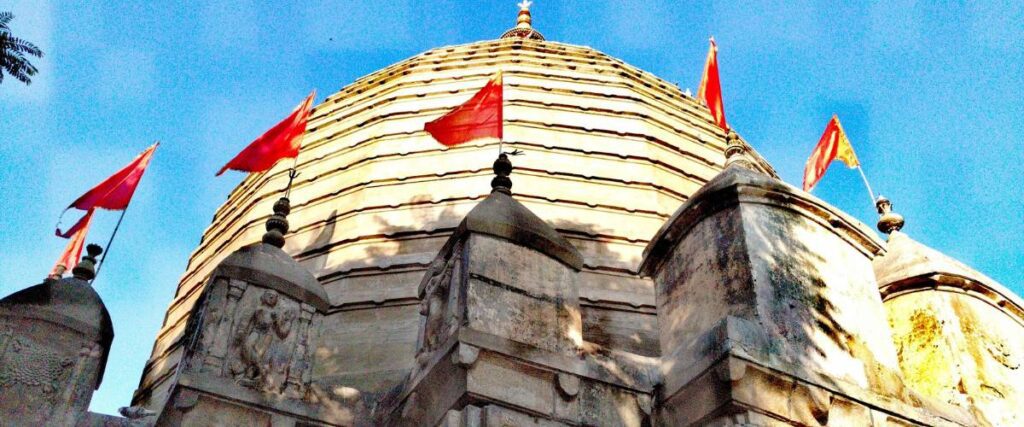
Best Time to Visit: October to April
Key Attractions: Kamakhya Temple, Nilachal Hill
Distance: Located in Guwahati
Perched atop Nilachal Hill, the Kamakhya Temple is a spiritual retreat. The best time to visit is from October to April. Experience the spiritual aura, participate in religious rituals, and enjoy panoramic views of the Brahmaputra River.
Suggested Read: Kamakhya temple 6 fascinating facts you need to know.
7. Unwind at Dzukou Valley
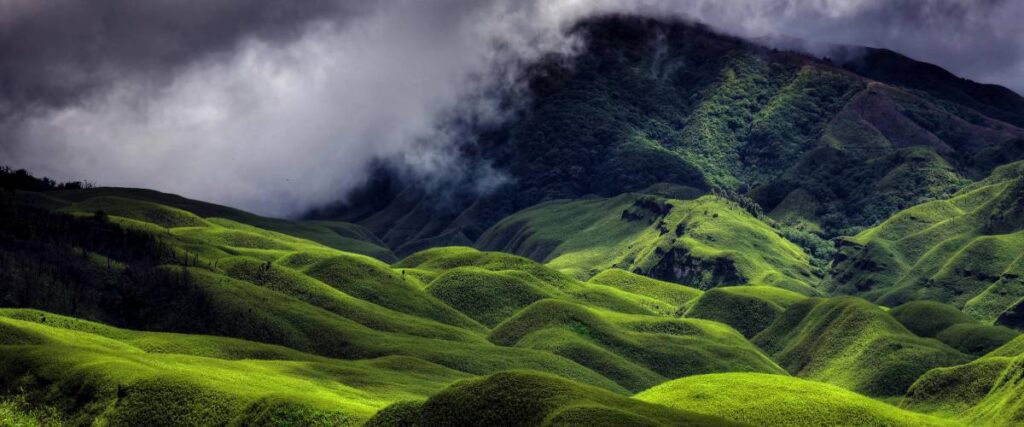
Best Time to Visit: June to September
Key Attractions: Dzukou Valley, trekking trails, vibrant flowers
Distance: Approximately 20 kilometers from Kohima
Dzukou Valley, nestled on the border of Nagaland and Manipur, is a trekker’s paradise. The best time to visit is from June to September. Explore the trekking trails, witness vibrant flowers, and experience the serenity of the valley.
8. Historical Ruins of the Ahom Kingdom
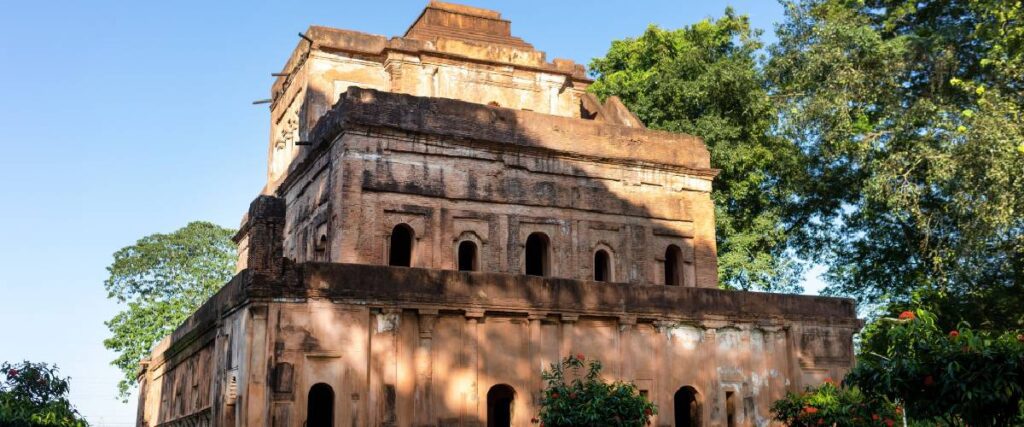
Best Time to Visit: October to March
Key Attractions: Talatal Ghar, Rang Ghar
Distance: Approximately 360 kilometers from Guwahati
Step back in time at Sivasagar, exploring the ancient ruins of the Ahom Kingdom. The best time to visit is from October to March. Discover architectural wonders like Talatal Ghar and Rang Ghar with fascinating historical stories.
9. Soak in the Serenity of Pelling
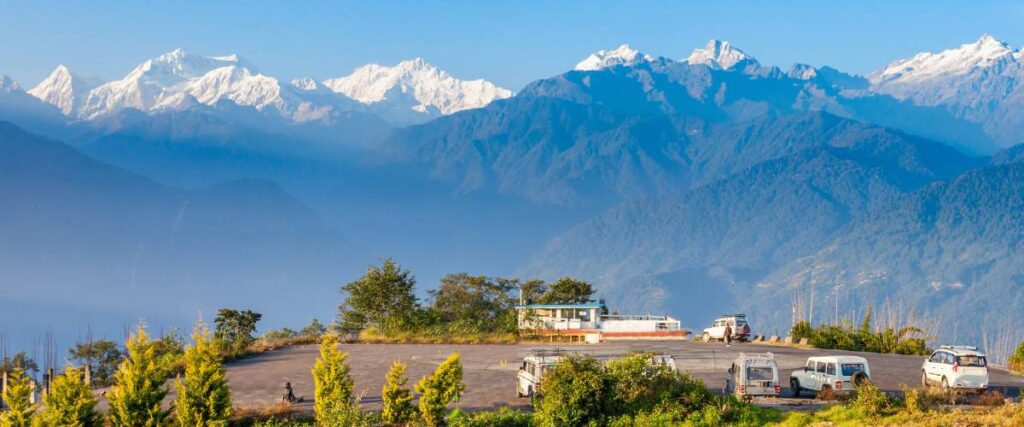
Best Time to Visit: March to May and September to November
Key Attractions: Kanchenjunga range, Pemayangtse Monastery, Rabdentse Ruins
Distance: Approximately 120 kilometers from Gangtok
Situated in West Sikkim, Pelling offers stunning views of the Kanchenjunga range. The best time to visit is from March to May and September to November. Explore the Pemayangtse Monastery and the historical Rabdentse Ruins.
Suggested Read: Top 10 places to visit in Pelling.
10. Breath-Taking Tea Gardens of Assam

Best Time to Visit: October to April
Key Attractions: Assam Tea Gardens, Jorhat, Dibrugarh
Distance: Varies depending on the tea estate
Take a stroll through the lush tea gardens of Assam, with the best time to visit is from October to April. Please remember to visit Jorhat or Dibrugarh to witness the tea-making process and delve into the rich history of Assam tea.
11. Explore the Unique Living Root Bridges
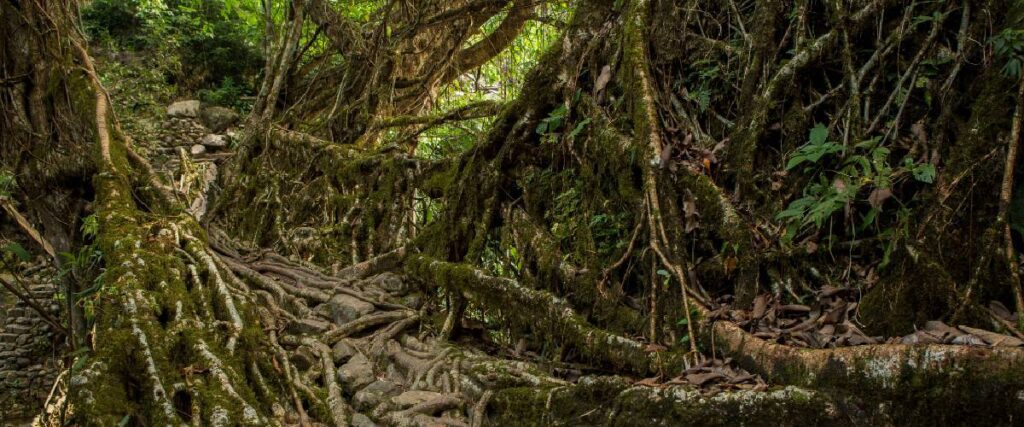
Best Time to Visit: October to May
Key Attractions: Double Decker Root Bridge, Nongriat village
Distance: Approximately 75 kilometers from Shillong
Meghalaya boasts living root bridges, an ingenious creation by the Khasi tribes. The best time to visit is from October to May. The Double Decker Root Bridge in Nongriat is a must-see, showcasing the unique collaboration between nature and man.
Suggested Read: Best places to visit in Meghalaya.
12. Aizawl: Capital of Mizoram
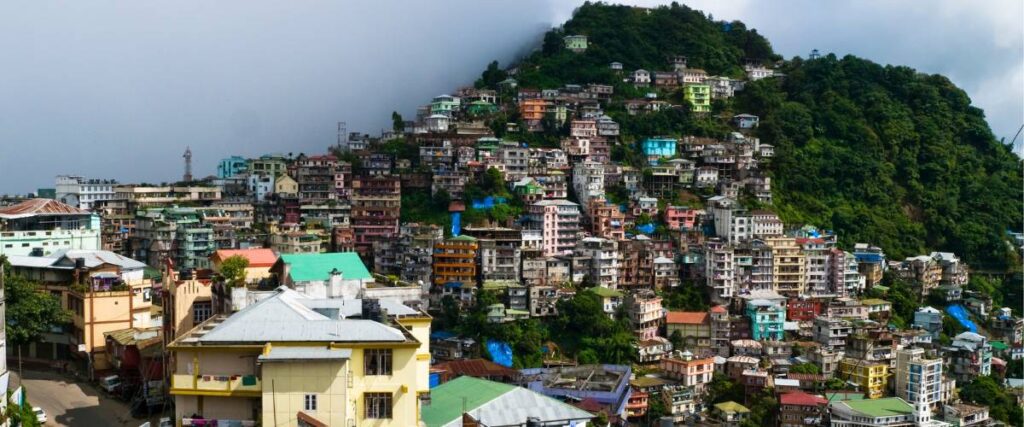
Best Time to Visit: October to March
Key Attractions: Mizoram State Museum, Durtlang Hills, Bara Bazar
Distance: Approximately 466 kilometers from Guwahati
Aizawl, the capital of Mizoram, is a blend of tradition and modernity. The best time to visit is from October to March. Explore the Mizoram State Museum, enjoy panoramic views from Durtlang Hills, and indulge in the vibrant markets of Bara Bazar.
13. Tranquil Agartala
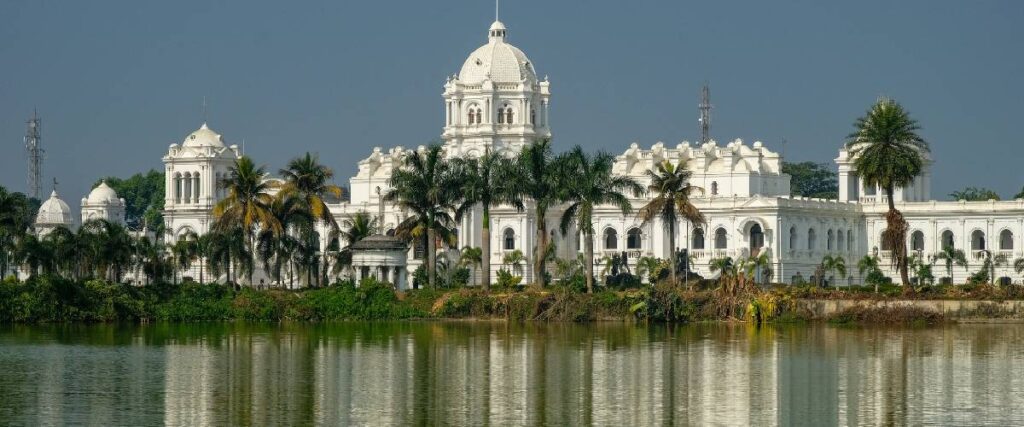
Best Time to Visit: October to March
Key Attractions: Ujjayanta Palace, Neermahal Palace, Tripura Sundari Temple
Distance: Approximately 550 kilometers from Guwahati
Agartala, the capital city of Tripura, offers a tranquil escape. The best time to visit is from October to March. Explore the grandeur of Ujjayanta Palace, the lake Palace Neermahal, and the divine Tripura Sundari Temple.
14. Teesta River Rafting Adventure

Best Time to Visit: March to June and September to November
Key Attractions: Teesta River, white-water rafting
Distance: Depends on the starting point; popular from Gangtok
For adrenaline junkies, Teesta River offers thrilling white-water rafting experiences. The best time to visit is from March to June and September to November. Enjoy the rush of the gushing waters and the scenic landscapes along the river.
15. Marvel at the Unakoti Sculptures
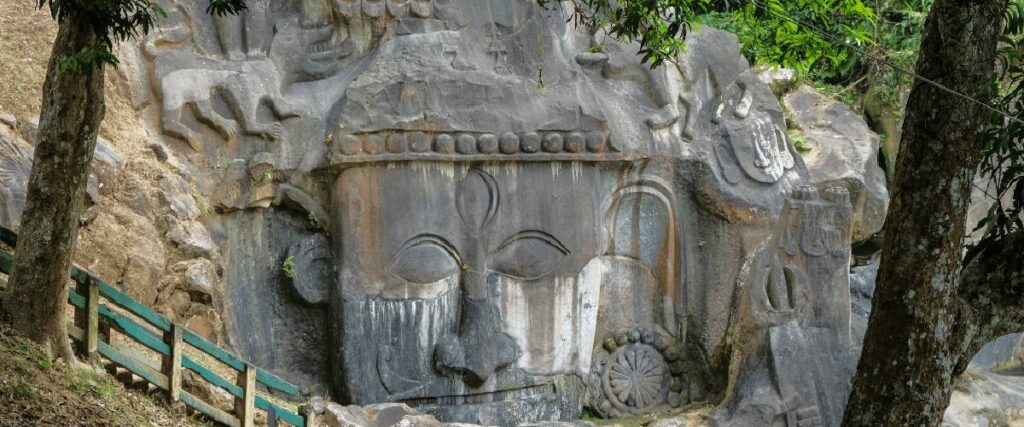
Best Time to Visit: October to March
Key Attractions: Unakoti rock-cut sculptures
Distance: Approximately 180 kilometers from Agartala
Unakoti, in Tripura, is renowned for its ancient rock-cut sculptures. The best time to visit is from October to March. Explore the impressive carvings that date back to the 7th century and unravel the mysteries behind these unique sculptures.
16. Namdapha National Park
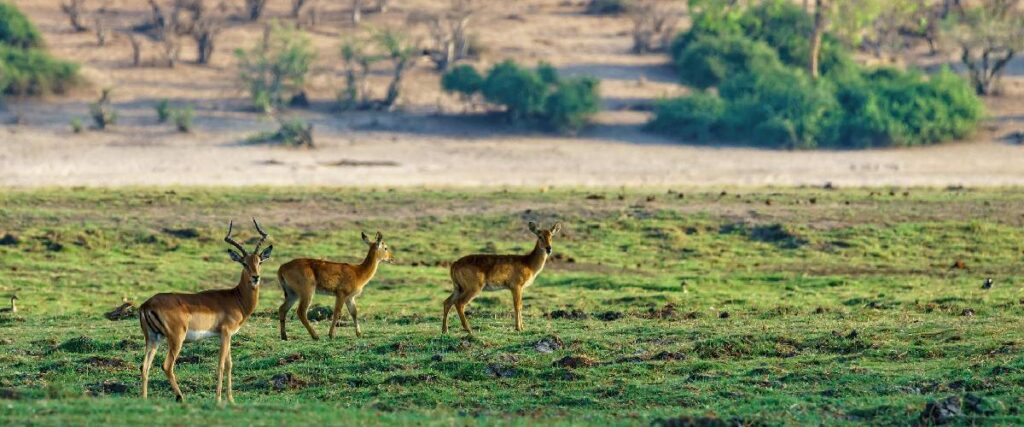
Best Time to Visit: October to April
Key Attractions: Biodiversity, trekking trails
Distance: Approximately 180 kilometers from Dibrugarh (the nearest major town)
In Arunachal Pradesh, Namdapha National Park is a biodiversity hotspot. The best time to visit is from October to April. Explore the dense forests, embark on trekking trails, and witness a myriad of unique flora and fauna.
17. Adventure at Nuranang Falls
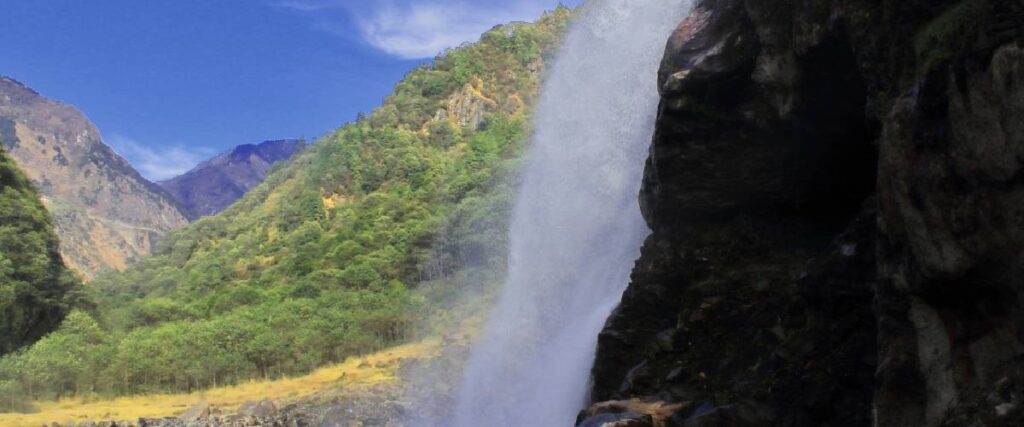
Best Time to Visit: October to April
Key Attractions: Nuranang Falls, scenic landscapes
Distance: Approximately 40 kilometers from Tawang
Nuranang Falls, also known as Jang Falls, is a hidden gem in Tawang. The best time to visit is from October to April. Enjoy the cascading beauty of the waterfall amidst the pristine landscapes of Tawang.
18. Discover Sualkuchi – Silk Town of Assam

Best Time to Visit: October to April
Key Attractions: Silk weaving, traditional craftsmanship
Distance: Approximately 35 kilometers from Guwahati
Known as the Silk Town of Assam, Sualkuchi is famous for its traditional silk weaving. The best time to visit is from October to April. Witness the craftsmanship and vibrant silk sarees that are a testament to Assam’s rich textile heritage.
19. Wildlife Safari at Manas National Park
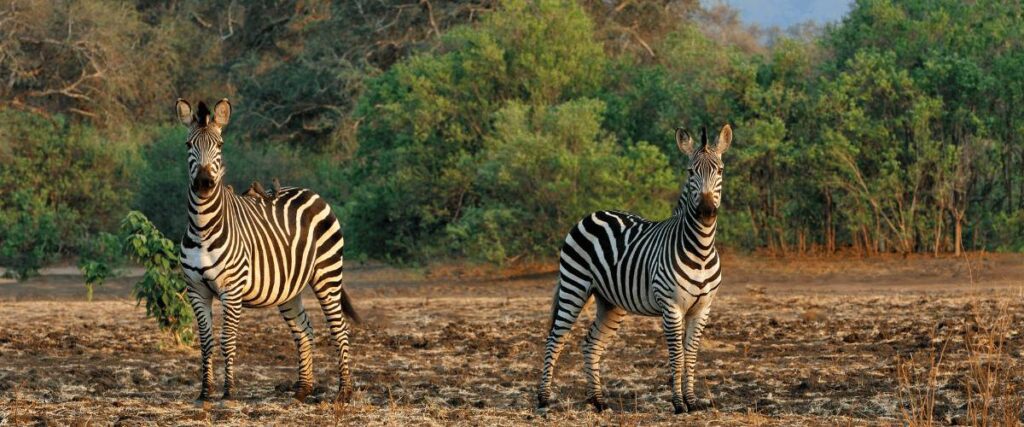
Best Time to Visit: October to April
Key Attractions: Bengal tigers, one-horned rhinoceros, diverse wildlife
Distance: Approximately 150 kilometers from Guwahati
Manas National Park, a UNESCO World Heritage Site, is a haven for wildlife enthusiasts. The best time to visit is from October to April. Embark on a wildlife safari to spot Bengal tigers, one-horned rhinoceros, and a myriad of bird species.
20. Festivals in Nagaland
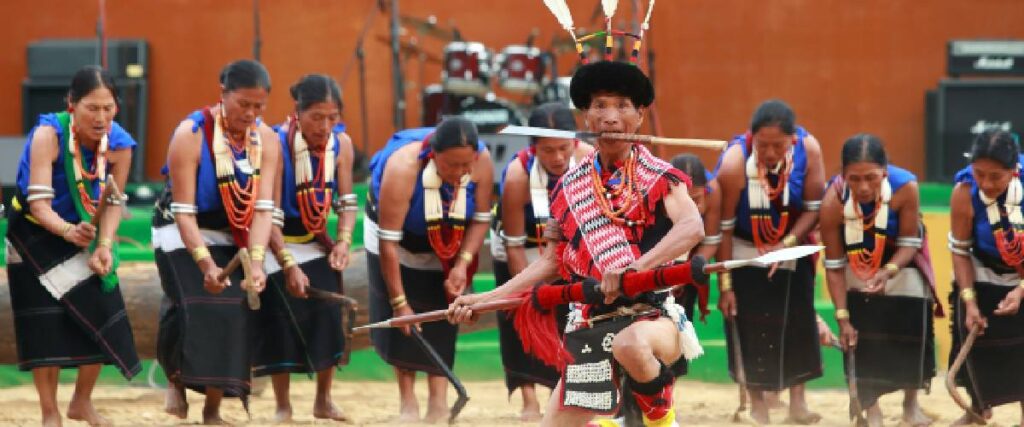
Best Time to Visit: December to February (Hornbill Festival)
Key Attractions: Hornbill Festival, traditional dances, indigenous cuisines
Distance: Varies; main festival held in Kohima
Experience the vibrant and culturally rich festivals of Nagaland, such as the Hornbill Festival. The best time to visit for the Hornbill Festival is from December to February. Immerse yourself in the traditional dances, music, and indigenous cuisines for a memorable cultural extravaganza.
Conclusion
North East India beckons with its diverse offerings, from lush landscapes to rich cultural experiences. This detailed guide provides insights into the best times to visit, key attractions, and distances to help you plan an unforgettable journey. Don’t forget to share your experiences on social media and spread the word about the hidden gems of North East India.
This is just a taste of the treasures that await! From the vibrant Shillong to the serene Pelling, from the adventurous Dibrugarh to the historical Kohima, each destination promises an unforgettable experience.
So, what are you waiting for? Pack your bags, let your wanderlust guide you, and discover the magic of Northeast India!
Frequently Asked Questions
Q1: What makes North East India unique?
North East India stands out for its diverse landscapes, rich cultural heritage, and warm hospitality. It’s a melting pot of traditions, festivals, and breathtaking natural beauty.
Q2: Are these places easily accessible for tourists?
Yes, with improving infrastructure, most of the top destinations in North East India are now easily accessible, ensuring a comfortable and memorable travel experience.
Q3: What is the best time to visit these places?
The best time to visit North East India is during the pleasant months of October to April, when the weather is conducive to exploring the region’s beauty.
Q4: Is North East India safe for solo travelers?
North East India is generally safe for solo travelers. However, like any travel destination, it’s advisable to stay informed about local customs and take necessary precautions.
Q5: Can I experience local cuisines in these places?
Absolutely! Each state in North East India has its unique culinary delights. Don’t miss the opportunity to savor the local flavors and traditional dishes during your visit.
Q6: Are there any specific travel restrictions or permits required for North East India?
Yes, certain areas in North East India may require permits for tourists. It’s essential to check and obtain the necessary permits before planning your visit.
Q7: Can I find accommodation options catering to different budgets in these regions?
Absolutely! From budget-friendly guesthouses to luxurious resorts, North East India offers a range of accommodation options to suit every traveler’s preferences and budget.
Q8: What transportation options are available to explore these destinations?
Transportation infrastructure has improved in recent years. You can choose from a mix of buses, taxis, and shared jeeps to travel within the region. Domestic flights and train services are also available to major cities.
Q9: Are there any specific cultural etiquettes visitors should be aware of?
Respecting local customs and traditions is crucial. For example, it’s customary to seek permission before photographing locals, especially in tribal areas. Being aware of and respecting cultural norms enhances the overall travel experience.
Q10: How can I plan an eco-friendly trip to North East India?
Being mindful of your ecological impact is essential. Choose eco-friendly accommodations, minimize single-use plastics, and participate in local conservation efforts. Responsible tourism ensures the preservation of the region’s natural beauty.
Q11: Are there English-speaking guides available in North East India?
Yes, many tourist destinations in North East India have English-speaking guides to enhance your travel experience and provide insights into the local culture and history.
Q12: Can I use credit cards or should I carry cash for transactions?
While larger cities and towns accept credit cards, it’s advisable to carry sufficient cash, especially when exploring remote areas where electronic transactions may be limited.
Q13: What adventure activities can I indulge in across these regions?
North East India offers a plethora of adventure activities, including trekking, river rafting, paragliding, and wildlife safaris. Adventure enthusiasts will find ample opportunities to satisfy their adrenaline cravings.
Q14: How diverse is the wildlife in North East India?
The region boasts incredible biodiversity. From the iconic one-horned rhinoceros in Assam to the elusive red panda in Sikkim, North East India is a haven for wildlife enthusiasts and nature lovers.
Q15: Are there specific health precautions I should take before visiting North East India?
It’s advisable to consult a healthcare professional for vaccinations and health precautions before traveling. Carry a basic medical kit and stay hydrated to ensure a healthy and enjoyable trip.
Q16: Can I engage with local communities and learn about their traditions?
Yes, engaging with local communities is encouraged. Participate in local festivals, visit markets, and interact with the friendly locals to gain a deeper understanding of the rich cultural tapestry of North East India.
Q17: What’s the significance of the traditional attire worn by people in these regions?
The traditional attire in North East India is not just clothing; it’s a representation of the region’s cultural diversity. Each community has its unique traditional dress, often woven with stories of their heritage.
Q18: Are there any specific precautions for high-altitude destinations like Tawang?
Travelers heading to high-altitude destinations should be aware of altitude sickness. It’s advisable to acclimatize gradually, stay hydrated, and seek medical attention if experiencing severe symptoms.
Q19: Can I capture the scenic beauty in North East India through photography?
Absolutely! North East India is a photographer’s paradise. From lush landscapes to vibrant festivals, the region offers endless opportunities for capturing breathtaking moments. Ensure you respect local photography regulations.
Q20: What cultural festivals should I plan my visit around for an immersive experience?
Plan your visit during festivals like Bihu in Assam, Losar in Sikkim, or Hornbill Festival in Nagaland for a truly immersive cultural experience. These festivals showcase the region’s traditions, music, and vibrant celebrations.
Prepare for an unforgettable journey to North East India armed with these additional FAQs, and let the exploration of this magical region begin!

